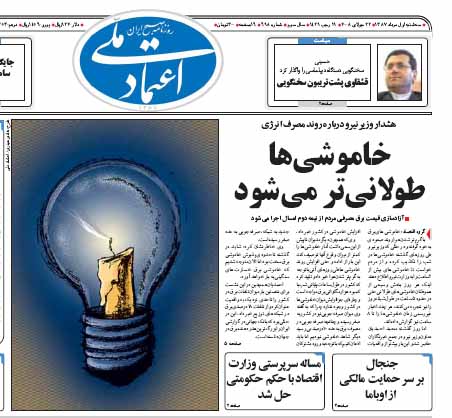It was hard to miss the dramatic picture and headline screaming “Blackouts becoming longer” in Etemaad-e Melli. It alleges the Energy Ministry is minimizing the real impact of the blackouts, citing unofficial reports that power cuts are now reaching eight hours in some places. It’s shaping up to be a hot summer and its not even August yet.
Ahmadinejad’s gas rationing program, which caused riots when it was introduced in June of last year, is still in effect, and is reported to have stoked the black market for petrol. Former energy minister Kazem Vaziri Hamaneh warned that Iran was facing an energy “catastrophe” as he was replaced in a cabinet reshuffle two months later.
This type of storyline tends to arouse those in the US Congress who see energy as a pressure point and the nutty idea that America could enforce some type of gasoline blockage against Iran, which would make them give up nuclear. Given that Iran argues it needs a self-sufficient nuclear power capacity to ease its energy problems and hedge against foreign energy meddling, I doubt this would work.
View from Iran has more on Iran’s economic situation, and Iran Nuclear Watch is closely following the extremely misguided HR 362 sanctions act that would require the U.S. to lead an “international effort” to blockade petroleum products going into Iran.


5 thoughts on “Blackouts in Iran”
Actually, Ahmadinejad is doing a good job converting Iran’s cars to use natural gas, thereby minimizing the impact of a gasoline blockade.
http://www.iags.org/iran121206.pdf
As for the economy, its actually performing well in macro terms
http://www.usip.org/pubs/usipeace_briefings/2007/0510_iran_economic_crisis.html
That’s very interesting about the gas car conversions. I see this doc is from 2006, do you know if they have been meeting their projections for new gas vehicles since then?
On the macro economy, I agree with you that claims Iran’s economy is in a crisis are overblown. The CRS report I blogged about shows Iran is a bit behind, but still in league, with its neighbors in terms of GDP growth. But my main point in the post was that these narratives – true or not – about Iran’s economy become fodder for people advocating for measures like HR 362. Thanks for your comment.
Excellent post Will – just a thought. Do you think branding around Cairo is problematic if you’re focusing on Iran? Will definitely keep in touch with the blog from here on in. Cheers.
Anyway, the blackouts have nothing to do with gasoline or energy per se — it is the draught which has reduced the water level at the dams. Would have happened regardless. Average per capita consumption of energy by Iranians is quite high, being subsidized.
In most cities, blackouts like this are avoided by having power plants (usually fuelled by coal or oil) that can be powered up or down very quickly to fill the gap if normal energy sources fail to meet demand. Obviously this isn’t happening in Iran. I agree that the power cuts have nothing to do with gasoline, but they have everything to do with a place’s energy infrastructure.
Comments are closed.